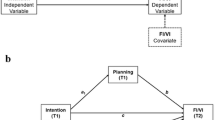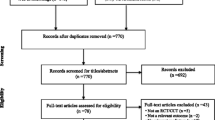Abstract
Background
Incentive interventions have gained popularity to motivate health behavior change, but some psychological theorists caution that they may have deleterious effects on factors that potentiate behavior maintenance. Importantly, no empirical study has tested whether incentives indeed have iatrogenic effects on key psychological constructs associated with health behavior change and maintenance.
Purpose
The study aims to explore the effects of monetary incentives on theoretically informed psychological constructs and fruit and vegetable consumption.
Methods
Individuals reporting insufficient fruit and vegetable consumption were randomly assigned to receive either daily monetary incentives, delayed monetary incentives, or no incentives for their fruit and vegetable consumption during a 3-week intervention period. Behavior engagement and psychological factors were measured at baseline, at the end of the intervention, and 2 weeks following the cessation of the intervention.
Results
Participants in the daily incentive condition demonstrated the greatest increase in self-reported consumption during the intervention and at the follow-up. Moreover, increases in consumption during the intervention period were associated with increases in attitudes and self-efficacy, which, in turn, predicted behavior maintenance at follow-up. Intrinsic motivation to consume fruits and vegetables increased over time across the entire sample but did not differ between groups.
Conclusions
Monetary incentives can alter health behavior engagement without decreasing intrinsic motivation or other relevant cognitive and motivational constructs. Further, although incentives may serve as a vehicle to initiate behavior change, increased experience with the behavior may then lead to enhancements in key psychological constructs that serve as mechanisms to potentiate behavior maintenance following the cessation of incentives.
Trial Registration Number
The trial was registered with the ClinicalTrials.gov database (NCT02594319) https://www.clinicaltrials.gov/ct2/show/NCT02594319.
Similar content being viewed by others
References
K. Cahill, J. Hartmann-Boyce, R. Perera, Incentives for smoking cessation, Cochrane Libr. (2015).
A. Giuffrida, D.J. Torgerson, Should we pay the patient? Review of financial incentives to enhance patient compliance, Bmj. 315 (1997) 703–707.
M.S. Mitchell, J.M. Goodman, D.A. Alter, L.K. John, P.I. Oh, M.T. Pakosh, G.E. Faulkner, Financial incentives for exercise adherence in adults: systematic review and meta-analysis, Am. J. Prev. Med. 45 (2013) 658–667.
K.M. Madison, K.G. Volpp, S.D. Halpern, The law, policy, and ethics of employers’ use of financial incentives to improve health, J. Law. Med. Ethics. 39 (2011) 450–468.
I. Ajzen, From intentions to actions: A theory of planned behavior, in: Action Control, Springer, 1985: pp. 11–39.
R.M. Ryan, E.L. Deci, Self-determination theory and the facilitation of intrinsic motivation, social development, and well-being., Am. Psychol. 55 (2000) 68.
G. Godin, G. Kok, The theory of planned behavior: a review of its applications to health-related behaviors, Am. J. Health Promot. 11 (1996) 87–98.
R.M. Ryan, H. Patrick, E.L. Deci, G.C. Williams, Facilitating health behaviour change and its maintenance: interventions based on self-determination theory, Eur. Health Psychol. 10 (2008) 2–5.
G. Loewenstein, J. Price, K. Volpp, Habit formation in children: evidence from incentives for healthy eating, J. Health Econ. 45 (2016) 47–54.
R.M. Ryan, J. Kuhl, E.L. Deci, Nature and autonomy: an organizational view of social and neurobiological aspects of self-regulation in behavior and development, Dev. Psychopathol. 9 (1997) 701–728.
A.C. Moller, E.L. Deci, The psychology of getting paid: An integrated perspective, in: Psychol. Sci. Money, Springer, 2014: pp. 189–211.
A.C. Moller, J. Buscemi, H.G. McFadden, D. Hedeker, B. Spring, Financial motivation undermines potential enjoyment in an intensive diet and activity intervention, J. Behav. Med. 37 (2014) 819–827.
M.R. Lepper, D. Greene, R.E. Nisbett, Undermining children’s intrinsic interest with extrinsic reward: a test of the“ overjustification” hypothesis., J. Pers. Soc. Psychol. 28 (1973) 129.
A.C. Moller, H. McFadden, D. Hedeker, B. Spring, Financial motivation undermines maintenance in an intensive diet and activity intervention, J. Obes. 2012 (2012).
D.R. Just, J. Price, Using incentives to encourage healthy eating in children, J. Hum. Resour. 48 (2013) 855–872.
M. Promberger, T.M. Marteau, When do financial incentives reduce intrinsic motivation? Comparing behaviors studied in psychological and economic literatures., Health Psychol. 32 (2013) 950.
J. Adams, E.L. Giles, E. McColl, F.F. Sniehotta, Carrots, sticks and health behaviours: a framework for documenting the complexity of financial incentive interventions to change health behaviours, Health Psychol. Rev. 8 (2014) 286–295.
R.J. Burns, A.S. Donovan, R.T. Ackermann, E.A. Finch, A.J. Rothman, R.W. Jeffery, A theoretically grounded systematic review of material incentives for weight loss: implications for interventions, Ann. Behav. Med. 44 (2012) 375–388.
M.S. Patel, D.A. Asch, A.B. Troxel, M. Fletcher, R. Osman-Koss, J. Brady, L. Wesby, V. Hilbert, J. Zhu, W. Wang, Premium-based financial incentives did not promote workplace weight loss in a 2013–15 study, Health Aff. (Millwood). 35 (2016a) 71–79.
M.S. Patel, D.A. Asch, R. Rosin, D.S. Small, S.L. Bellamy, K. Eberbach, K.J. Walters, N. Haff, S.M. Lee, L. Wesby, Individual versus team-based financial incentives to increase physical activity: a randomized, controlled trial, J. Gen. Intern. Med. (2016b) 1–9.
M. Ross, Salience of reward and intrinsic motivation., J. Pers. Soc. Psychol. 32 (1975) 245.
H.M. Aljadani, A. Patterson, D. Sibbritt, M.J. Hutchesson, M.E. Jensen, C.E. Collins, Diet quality, measured by fruit and vegetable intake, predicts weight change in young women, J. Obes. 2013 (2013).
K. He, F.B. Hu, G.A. Colditz, J.E. Manson, W.C. Willett, S. Liu, Changes in intake of fruits and vegetables in relation to risk of obesity and weight gain among middle-aged women, Int. J. Obes. 28 (2004) 1569–1574.
H.-C. Hung, K.J. Joshipura, R. Jiang, F.B. Hu, D. Hunter, S.A. Smith-Warner, G.A. Colditz, B. Rosner, D. Spiegelman, W.C. Willett, Fruit and vegetable intake and risk of major chronic disease, J. Natl. Cancer Inst. 96 (2004) 1577–1584.
F.J. He, C.A. Nowson, G.A. MacGregor, Fruit and vegetable consumption and stroke: meta-analysis of cohort studies, The Lancet. 367 (2006) 320–326.
L. Dauchet, P. Amouyel, S. Hercberg, J. Dallongeville, Fruit and vegetable consumption and risk of coronary heart disease: a meta-analysis of cohort studies, J. Nutr. 136 (2006) 2588–2593.
L.A. Bazzano, J. He, L.G. Ogden, C.M. Loria, S. Vupputuri, L. Myers, P.K. Whelton, Fruit and vegetable intake and risk of cardiovascular disease in US adults: the first National Health and Nutrition Examination Survey epidemiologic follow-up study, Am. J. Clin. Nutr. 76 (2002) 93–99.
F.J. He, C.A. Nowson, M. Lucas, G.A. MacGregor, Increased consumption of fruit and vegetables is related to a reduced risk of coronary heart disease: meta-analysis of cohort studies, J. Hum. Hypertens. 21 (2007) 717–728.
U.S. Department of Agriculture and U.S. Department of Health and Human Services, Dietary Guidelines for Americans, 2010, (2010).
Centers for Disease Control and Prevention, State Indicator Report on Fruits and Vegetables, 2013, (2013).
K.G. Volpp, G. Loewenstein, A.B. Troxel, J. Doshi, M. Price, M. Laskin, S.E. Kimmel, A test of financial incentives to improve warfarin adherence, BMC Health Serv. Res. 8 (2008) 1.
P.A. Harris, R. Taylor, R. Thielke, J. Payne, N. Gonzalez, J.G. Conde, Research electronic data capture (REDCap)—a metadata-driven methodology and workflow process for providing translational research informatics support, J. Biomed. Inform. 42 (2009) 377–381.
Epidemiology and Genomics Research Program, Division of Cancer Control & Population Sciences, Dietary Screener Questionnaire in the NHANES 2009–10: Background, (n.d.). http://epi.grants.cancer.gov/nhanes/dietscreen/ (accessed October 15, 2015).
C.S. Levesque, G.C. Williams, D. Elliot, M.A. Pickering, B. Bodenhamer, P.J. Finley, Validating the theoretical structure of the Treatment Self-Regulation Questionnaire (TSRQ) across three different health behaviors, Health Educ. Res. 22 (2007) 691–702.
United States Department of Agriculture, All about the vegetable group, (n.d.-a). http://www.choosemyplate.gov/vegetables.
United States Department of Agriculture, All about the fruit group, (n.d.-b). http://www.choosemyplate.gov/fruit.
M. Conner, P. Norman, R. Bell, The theory of planned behavior and healthy eating., Health Psychol. 21 (2002) 194.
A.P. Sen, D. Huffman, G. Loewenstein, D.A. Asch, J.T. Kullgren, K.G. Volpp, Do Financial incentives reduce intrinsic motivation for weight loss?, Nudging Health Health Law Behav. Econ. (2016) 202.
L.J. Cooke, L.C. Chambers, E.V. Añez, H.A. Croker, D. Boniface, M.R. Yeomans, J. Wardle, Eating for pleasure or profit the effect of incentives on children’s enjoyment of vegetables, Psychol. Sci. 22 (2011) 190–196.
J.M. Tybur, A.D. Bryan, A.E.C. Hooper, An evolutionary perspective on health psychology: new approaches and applications, Evol. Psychol. 10 (2012) 147470491201000500.
C.P. Cerasoli, J.M. Nicklin, M.T. Ford, Intrinsic motivation and extrinsic incentives jointly predict performance: a 40-year meta-analysis., Psychol. Bull. 140 (2014) 980.
E.L. Giles, S. Robalino, E. McColl, F.F. Sniehotta, J. Adams, The effectiveness of financial incentives for health behaviour change: systematic review and meta-analysis, PloS One. 9 (2014) e90347.
E. Mantzari, F. Vogt, I. Shemilt, Y. Wei, J.P. Higgins, T.M. Marteau, Personal financial incentives for changing habitual health-related behaviors: a systematic review and meta-analysis, Prev. Med. 75 (2015) 75–85.
G. Zimmerman, M.S. Roskos, C. Feller, C. Durward, Double up food bucks farmers’ market incentive program: food insecurity and fruit and vegetable consumption, FASEB J. 30 (2016) lb427-lb427.
M. Savoie-Roskos, C. Durward, M. Jeweks, H. LeBlanc, Reducing food insecurity and improving fruit and vegetable intake among farmers’ market incentive program participants, J. Nutr. Educ. Behav. 48 (2016) 70–76. e1.
L.E. Olsho, J.A. Klerman, P.E. Wilde, S. Bartlett, Financial incentives increase fruit and vegetable intake among Supplemental Nutrition Assistance Program participants: A randomized controlled trial of the USDA Healthy Incentives Pilot, Am. J. Clin. Nutr. (2016) ajcn129320.
J.E. Mazur, An adjusting procedure for studying delayed reinforcement, Commons ML Mazur JE Nevin JA. (1987) 55–73.
R. Thaler, Mental accounting and consumer choice, Mark. Sci. 4 (1985) 199–214.
W. Willett, Nutritional Epidemiology, 3rd ed., Oxford University Press, Oxford, 2012.
Y. Bao, J. Han, F.B. Hu, E.L. Giovannucci, M.J. Stampfer, W.C. Willett, C.S. Fuchs, Association of nut consumption with total and cause-specific mortality, N. Engl. J. Med. 369 (2013) 2001–2011.
A. Pan, Q. Sun, A.M. Bernstein, M.B. Schulze, J.E. Manson, M.J. Stampfer, W.C. Willett, F.B. Hu, Red meat consumption and mortality: results from 2 prospective cohort studies, Arch. Intern. Med. 172 (2012) 555–563.
A. Satija, E. Yu, W.C. Willett, F.B. Hu, Objective measures are complementary to, rather than a replacement for, self-reported methods, Int. J. Obes. 39 (2015) 1179–1179.
B. Spring, K. Schneider, H.G. McFadden, J. Vaughn, A.T. Kozak, M. Smith, A.C. Moller, L. Epstein, S.W. Russell, A. DeMott, Make better choices (MBC): study design of a randomized controlled trial testing optimal technology-supported change in multiple diet and physical activity risk behaviors, BMC Public Health. 10 (2010) 1.
B. Spring, K. Schneider, H.G. McFadden, J. Vaughn, A.T. Kozak, M. Smith, A.C. Moller, L.H. Epstein, A. DeMott, D. Hedeker, Multiple behavior changes in diet and activity: a randomized controlled trial using mobile technology, Arch. Intern. Med. 172 (2012) 789–796.
L.H. Epstein, S.J. Salvy, K.A. Carr, K.K. Dearing, W.K. Bickel, Food reinforcement, delay discounting and obesity, Physiol. Behav. 100 (2010) 438–445.
Acknowledgements
This research was funded by a National Science Foundation Graduate Research Fellowship awarded to Casey K. Gardiner. Data were collected and managed in REDCap (NIH/NCRR Colorado CTSI Grant UL1 TR001082). The authors wish to acknowledge Layne Perkins and Dominique Pataroque for their assistance with data collection.
Author information
Authors and Affiliations
Corresponding author
Ethics declarations
Conflicts of Interest
Authors Casey K. Gardiner and Angela D. Bryan declare that they have no conflict of interest. All procedures, including the informed consent process, were conducted in accordance with the ethical standards of the responsible committee on human experimentation (institutional and national) and with the Helsinki Declaration of 1975, as revised in 2000.
Funding
This research was funded by a National Science Foundation Graduate Research Fellowship awarded to Casey K. Gardiner.
About this article
Cite this article
Gardiner, C.K., Bryan, A.D. Monetary Incentive Interventions Can Enhance Psychological Factors Related to Fruit and Vegetable Consumption. ann. behav. med. 51, 599–609 (2017). https://doi.org/10.1007/s12160-017-9882-4
Published:
Issue Date:
DOI: https://doi.org/10.1007/s12160-017-9882-4




